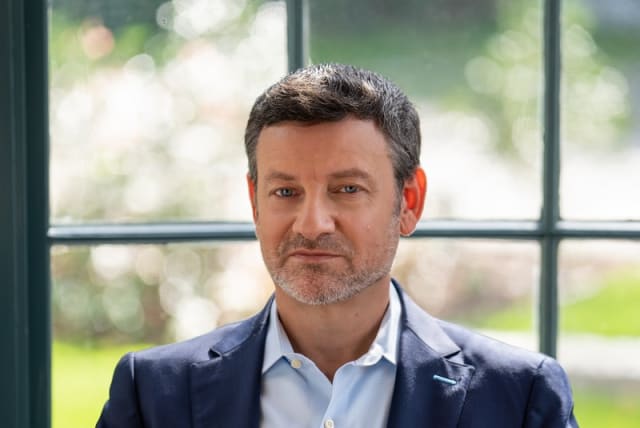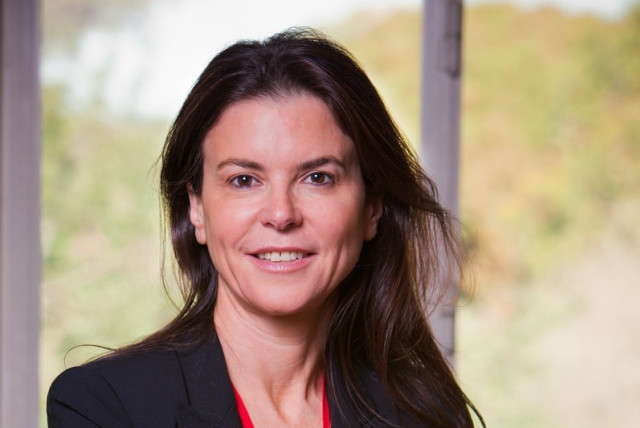Influential philanthropists view Israel as a vehicle for bolstering American Jews’ identity

For Jay Ruderman and Ofra Strauss – two leading figures in the Jewish and philanthropic world – reinforcing the critical Jewish-American/Israeli relationship is all about fostering dialogue.
A popular brand of jeans seems like an unlikely symbol of the early friendship between Israelis and American Jews. Yet, when asking two titular figures of the Jewish world what their first memories were of that relationship, they both remembered the little packages of Americana that arrived on many an Israeli doorstep.
Jewish-American philanthropist and social justice activist Jay Ruderman, president of the Ruderman Family Foundation, recalls growing up in the US knowing that he had relatives in Israel. “We had relatives from my father’s side who made aliyah in the late ’40s, and we always had a close connection with them. My mother’s family was involved in Young Judaea and made aliyah after 1967. So we always had these family ties in Israel that connected us with the country,” Ruderman says.
Meanwhile, first-generation Israeli Ofra Strauss remembers hearing of her almost mythological relatives from the US who sent coveted goodies to their home. Strauss is now the head of one of Israel’s largest food and beverage enterprises, but she came from humble beginnings. Born in Nahariya in northern Israel, Strauss joined the family business as a young girl. She had even joined her father in the family’s night delivery route carrying heavy packages of dairy products. To her family and many Israelis, American Jews were “the Big Brother” – someone who takes care of everyone. “I remember my mother’s stories of the Jewish Agency after the war [of Independence], before making aliyah in 1949 from Croatia,” Strauss says. “Everyone was very poor, and the locals were jealous of the Jews who had Israel for starting a new life.”Ruderman’s memory of a young and struggling Israel mirrors Strauss’s experience.
Visiting Israel for the first time when he was 13, after his bar mitzvah in the early 1980s: “On one hand, it was a developing country at the time. I remember being picked up at the airport by my cousin and asking him, ‘Why is there so much trash on the side of the road?’”
As Israel continued to grow and flourish, so has Ruderman’s involvement in the discourse surrounding key issues concerning the Israel-American Jewry relationship, even when it occasionally veers in a controversial or even confrontational direction. Ruderman notes that the foundation’s current efforts hearken back to his roots.
“I grew up as a minority in the Boston area. I was made to feel like a minority, and there was a great deal of antisemitism. So, when we landed in Israel and we were going around the country, it was such a magical feeling for me personally, as a young teenager, that almost everyone in the country was Jewish,” he recalls.
“I had never experienced anything like it. The only time I was around a lot of Jews was in the synagogue. The idea of running into someone on the street, the policeman or someone picking up the garbage being Jewish was a mind-blowing experience for me at the time.”
The foundation has spearheaded multifaceted initiatives for more than two decades that solidify Israel’s relationship with American Jewry. Activities have included the Knesset Caucus for Israel-American Jewry Relations, which aims to elevate the concerns of American Jews within the Israeli legislature’s deliberations; the University of Haifa’s Ruderman Program for American Jewish Studies, a master’s degree that covers a range of issues pertaining to American Jewish life and American society; conferences and research projects that provide thought leaders and decision-makers with the data needed to properly understand the current trends in Israel-American Jewry relations; and a 10-part original video series, Jewish Foodie, which enticed Israelis to deepen their knowledge about the US Jewish communities by presenting different Jewish culinary scenes from around the country.
The foundation’s initiatives represent a manifestation of Ruderman’s unique personal philosophy and approach to change-making: the idea that advocacy and philanthropy, traditionally seen as separate sectors, can actually go hand in hand.
“To create disruption and ultimately, pro-social outcomes, we bring advocacy to our work. We’re comfortable with criticizing certain aspects of the community that we’re trying to change,” he explains. “We take staunch positions and use very strong language.
“Why don’t other foundations and philanthropic organizations do this? Many of them are too slow. They need to go through an entire process; it’s not natural for them to do it. They respond timidly to major news events or don’t respond at all, often out of fear of disappointing donors, grantees and other partners. Others fund advocacy but don’t take it on themselves.”
MEANWHILE, STRAUSS, a prominent figure in the business and philanthropic worlds, says that finding kinship between the Israeli and American Jewish communities has been a natural process.
She first visited the US when she moved to New York at 25, after her father-in-law had a meeting with Leonard Lauder and landed her a job with Estee Lauder.
“My husband and I moved to New York, and we had relationships only with American Jews, but it was really quite natural.” They would meet Jews through their parents and at work. “Two questions, and you knew whether they’re Jewish or not,” she recalls.
During that period, Estee Lauder International sent her to run training programs in different countries in Europe. “It was Yom Kippur. I flew to Austria and suddenly I thought to myself, ‘Wow, I’m never going to do work on Yom Kippur again.’
“It felt like I missed something important. Suddenly being away from home was a big revelation: I decided back then that there are certain things we’re going to start to do [as a family], such as going to the synagogue because otherwise, we’re not going to feel Jewish.”
She recalls that this was her big “aha” moment. “As Israelis, we can feel Jewish everywhere we go in our country; but when we leave, we have to actively try to be Jewish.”
Strauss points to the time she spent in the US that later led her to become a member of the Jewish Agency’s board of trustees. In 10 years on the board, Strauss notes, she learned to appreciate the “structure of the Jewish communities in the US. I always said to myself: ‘Wow, I’m really lucky to be part of this tribe.’”
She explains that now, as the chairperson of the Strauss Group, a prominent international food and beverages company, “I work my way through our tribe every time I’m abroad. We have businesses in different parts of the world, and it has become natural for me to reach out to people and ask the right questions to find out whether or not they are Jewish.”
For Ruderman, navigating the Israeli Jewish world was something he never imagined he would do. The first time he truly got to know Israelis – not American Israelis but native-born – was when he met Shira and her family. He remembers it being “sort of a culture shock” because “not only were they Israelis, but they were Sephardic. All of a sudden, I was surrounded by hundreds of new relatives.”
As titular figures in the philanthropic world, Strauss and Ruderman are keenly aware of how Israel’s prosperity has helped ignite its own need for philanthropy without relying exclusively on donations from abroad. Ruderman notes that Israel used to be a highly socialist country, and for decades philanthropy was not a big priority.
“At the beginning, the government took care of every aspect of life. Then, all of a sudden, Israeli philanthropists entered the picture and said, ‘We’re going to be involved in projects, even if the government has already been involved.’ Initially, there was suspicion. People would wonder, ‘As a philanthropist, why are you getting involved with these projects? What’s your specific motivation and what do you have to gain?’” Ruderman says.
Strauss agrees. “It’s also a generational thing. People just started to earn money from scratch. Many Israeli entrepreneurs began selling their businesses to American companies for big money.” She adds that “wherever I go in the US for business, and the people I’m meeting discover that I’m Israeli or Jewish, they always talk about the generosity of the Jewish community in America. It’s like a myth. It’s not proportional at all to its size.”
Strauss emphasizes something she wants readers of this interview to understand: “I don’t think it’s just about creating a melting pot. We don’t need to be the same. But when push comes to shove, we do share so many things in common. Our Judaism does not center only around faith. We need to develop other common values that can elicit mutual respect.”
With Israel approaching its 75th birthday, Ruderman believes that “the survival of Israel is of the utmost importance for the Jewish people. We know what it was like to be a Jew without a state of Israel, without the security of a Jewish state; a place to go to, a place to defend, and a place to be when Jews are in trouble. I don’t think we want to go back there... So, I think we want to do everything possible to make sure that the Jewish state is around, and we never lose it.” As far as American Jews are concerned, he adds that “they need Israel; they need Israel as a place to help shore up their identity.”
The interview is a joint project of the Ruderman Family Foundation and The Jerusalem Post in honor of Israel’s upcoming 75th Independence Day, recognizing its special connection with US Jewry.
The Ruderman Family Foundation
The Ruderman Family Foundation considers American Jewry a strategic asset for the State of Israel and a significant partner in the prosperity of the Jewish people worldwide. The Foundation works to strengthen the relationship between Israel and the American Jewish community by making the people of Israel, especially its leaders, aware of the contributions of American Jews to the realization of the Zionist dream since the establishment of the State. The Foundation has initiated academic programs dedicated to American Jewry. It has taken delegations of Israeli opinion leaders on US tours and has collaborated with research institutions and other organizations to bring information about Jewish communities in the US to the Israel public to bring about closer acquaintance between the two communities. The Foundation contributes to a better understanding on the part of Israelis of the needs, successes, and challenges of American Jews.
For more information: Ruderman Family Foundation
Read the previous article in the series >> When President Biden’s rabbi met an Ethiopian-Israeli Orthodox rabbi
Read the next article in the series >> Connecting the Start-Up Nation
A special project of the Ruderman Family Foundation
Jerusalem Post Store
`; document.getElementById("linkPremium").innerHTML = cont; var divWithLink = document.getElementById("premium-link"); if (divWithLink !== null && divWithLink !== 'undefined') { divWithLink.style.border = "solid 1px #cb0f3e"; divWithLink.style.textAlign = "center"; divWithLink.style.marginBottom = "15px"; divWithLink.style.marginTop = "15px"; divWithLink.style.width = "100%"; divWithLink.style.backgroundColor = "#122952"; divWithLink.style.color = "#ffffff"; divWithLink.style.lineHeight = "1.5"; } } (function (v, i) { });

